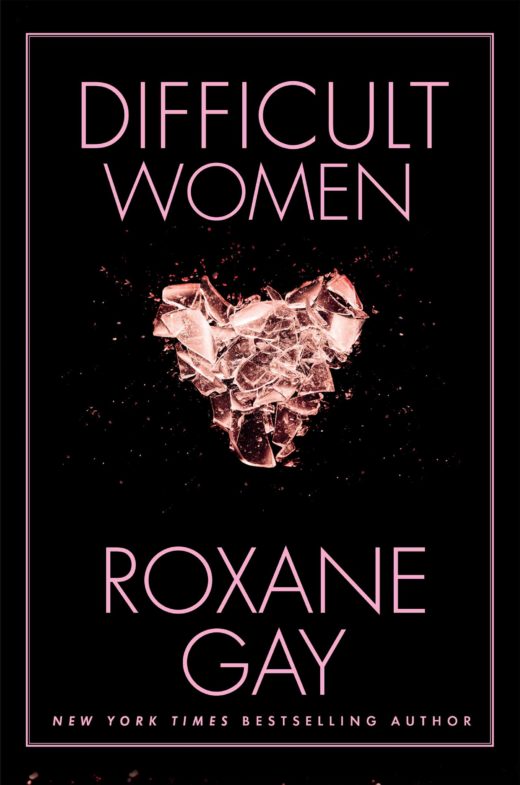- WHERE THE LITTLE POT SITS: A Search for Truth in Florida

- MIRROR STAGES: Brookhart Jonquil in Conversation
Difficult Women by Roxane Gay
Dana De Greff

As with her novel, An Untamed State, and book of essays, Bad Feminist, Gay is not afraid to explore taboo subjects, ruminate on the nebulous idea of womanhood, and develop complex characters that stick with you for days. Realistic storylines and hard themes like the effects of abuse, body insecurities, and trauma are present, but there’s also an element of playfulness steeped in fairytales and magical realism. In “Water, All Its Weight,” for example, a woman literally can’t escape the element, which ends up ruining her marriage: “Dean couldn’t handle the watery rot that followed Bianca. It was too much, the falling water, the decay everywhere.”
Continuing with the fantastical, “Requiem for a Glass Heart” centers on a woman made entirely of glass, with moments of excellent description: “As she catches her breath, she can often hear her heart threatening to implode with the high-pitched lamentation of glass succumbing to pressure.” The female characters in Gay’s stories aren’t limited to flesh and blood, nor are they any one way, in terms of personality; they enjoy their bodies, their desire and of course, sex.
Difficult women like having sex, and not the polite, quiet kind. One of the most memorable cases is found in “Baby Arm,” in which a couple gets turned on by (and use) a fiberglass baby arm. In the same story, women also beat the crap out of each other, à la fight club, because they “…are pretty and fucked up, girls who keep their ugly beneath the skin where it belongs, even though sometimes, it’s hard to keep it all in.”
There are moments of levity in these stories, but there are just as many dark turns. Unspeakable acts occur, and Gay is not one to gloss over them: rape, emotional and psychological abuse, and pedophilia, are just a few. And yet, the characters do not allow themselves to be destroyed. Much of that strength comes from bonds between women—sisters and best friends—relationships that are hard to describe but feel familiar and safe, places that make sense in a nonsensical world.
Gay revels in stereotypes and manages to break down almost every one, choosing women we’ve seen overrepresented in the media—strippers, abuse victims, wives, and girlfriends, who, for the most part, have been written or created by men. She shatters and rebuilds these tropes into new and more interesting forms.
And of course, there’s a bit of the political, as in (no surprise there) “FLORIDA.” Set in Naples, the story is a searing look at race and belonging within the context of a suburban community: “The ladies in her class loved to speak to Caridad in broken Spanish, to show her they were comfortable with her ethnicity despite the paleness of their skin and the wealth of their husbands.”
Difficult Women is an enjoyable read—some stories are near twenty pages, others a slim two; some revel in the first person, and some directly address the reader. The title story is also the most stylistically diverse, sectioned off into the following subcategories of “Difficult Women”: “loose,” “frigid,” “crazy,” “mothers,” and “dead girls.” Perhaps one of the more powerful stories in the collection, it’s a reminder of how far we’ve come in terms of gender equality, yet, not far enough.
Overall, Difficult Women is an ambitious offering by Gay, and a nice departure from her nonfiction essays and novel. Of course, not every story in the collection hits its mark. At times, the dialogue feels on the nose, and reading about so many despicable men can be exhausting. Still, perhaps, we’re not supposed to care so much about the men. While Gay chooses to label her women as “difficult,” the reader understands it’s a word synonymous with “strong,” “complex,” “challenging,” and, ultimately, “badass.”
Born in Miami, Dana De Greff is a Masters in Fine Arts candidate in fiction from the University of Miami and the Founder & Executive Director of PageSlayers Summer Camp, a 2016 Knight Arts Challenge Winner. Her work appears in Philadelphia Stories, Hawai’i Pacific Review, Gulf Stream Magazine, The Boston Review, The Miami Herald, and The New Tropic. In her spare time she teaches poetry to 3rd graders in Liberty City through The Sunroom.








